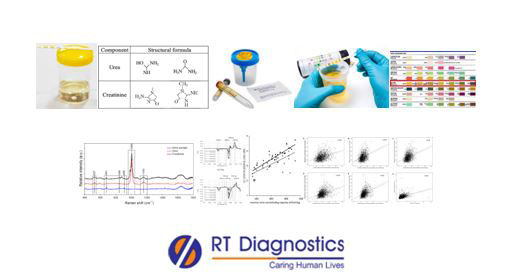Urea – Spot Urine:
Why Urea – Spot Urine Test?
CLINICAL INFORMATION
Urea is a catabolic end product of protein formed by the liver during protein catabolism (breakdown). This final end product is filtered and eliminated by the nephrons of the Kidney and is excreted through the urine. A 24-hours urine urea test is mainly used to help diagnose protein digestion or absorption from the gut, the patient’s protein balance and the amount of protein intake needed in certain cases. The body forms ammonia (a toxic compound for the brain) as an end product when proteins undergo catabolism (broken down), which is converted into a lesser toxic substance known as urea by the body. Since urea is a metabolic end product that is excreted by the kidneys, this test measures the amount of urea (amount of protein breakdown) excreted by the kidneys and also it reflects the amount of creatinine cleared by the kidneys, as performed as a part in the renal function test. This screening for BUN (Blood Urea Nitrogen) test is done to evaluate the patient’s kidney function. BUN level varies due to the diseases and/or disorders of the liver and/or kidneys. Urea test helps to evaluate the functioning of kidneys and liver and also it helps in the prognosis (to monitor during dialysis), to screen abnormalities in protein metabolism etc. Urea – Spot Urine Test: This test is mainly performed to evaluate a patient’s protein balance and the amount of protein needed in certain abnormal conditions like malnutrition and certain hypoproteinemia pathologies like nephrotic syndrome, liver disorders, chronic dehydration, inflammatory disorders etc. This test also helps in prognosis (protein replenishment) for patients who are under parenteral nutrition, thus helping in constant monitoring. The normal kidneys can eliminate the urea from the blood efficiently, while if the kidneys are not functioning well up to their optimal levels then the BUN level rises in the blood. These levels can also increase in certain disorders and diseases such as heart failure, dehydration or high protein diets and/or liver damage can also give false-positive test results, hence further investigations such as renal function tests or kidney biopsy confirm the conditions of the kidneys. Test for urea is usually done in pathologies related to altered levels of BUN (in certain pathologies) in the blood that reflects the pathology of the kidney, hence these factors prevent normal excretory function. This test is suggested in patients with symptoms of acute or chronic kidney failure due to underlying pathologies. High levels of urea may also indicate the risk of liver cancer (HCC), heart failure, high intake of proteins, excessive protein break down or dehydration. Low levels of urea in urine may suggest malnutrition, kidney disease, liver pathologies (liver cirrhosis, hepatic fibrosis) etc. Additional tests include creatinine test, LFT, Inulin test, Cystatin C, GFR, Imaging studies, renal artery blood flow (Doppler study) etc. Other tests include Diabetes mellitus, HbA1C (in diabetic non-compliant patients), Blood pressure, electrolyte panel etc.

General Instructions:
Sample Requirement: Specimen –Spot Urine sample. Test Preparation: None.
NOTE - Sample for specimen collections may vary based on the patient’s condition/cases according to the patient’s presenting complaints/signs or symptoms:
SPECIMEN REQUIREMENT (Special or Rare Cases) - As instructed and guided by Physician / Clinician / Pathologist / as per Laboratory’s requirements, according to procedures and protocols.
This Multi-Specialty Clinical Referral Laboratory RT DIAGNOSTICS provides precise and accurate tests with an extensive range of testing services to the medical centres to help in the diagnosis and identification of pathology in the test specimens for infectious diseases and also to evaluate the function of organ systems of the patient. It prevents further complications and helps to stabilize and restore health to near normalcy at the earliest without delay.



